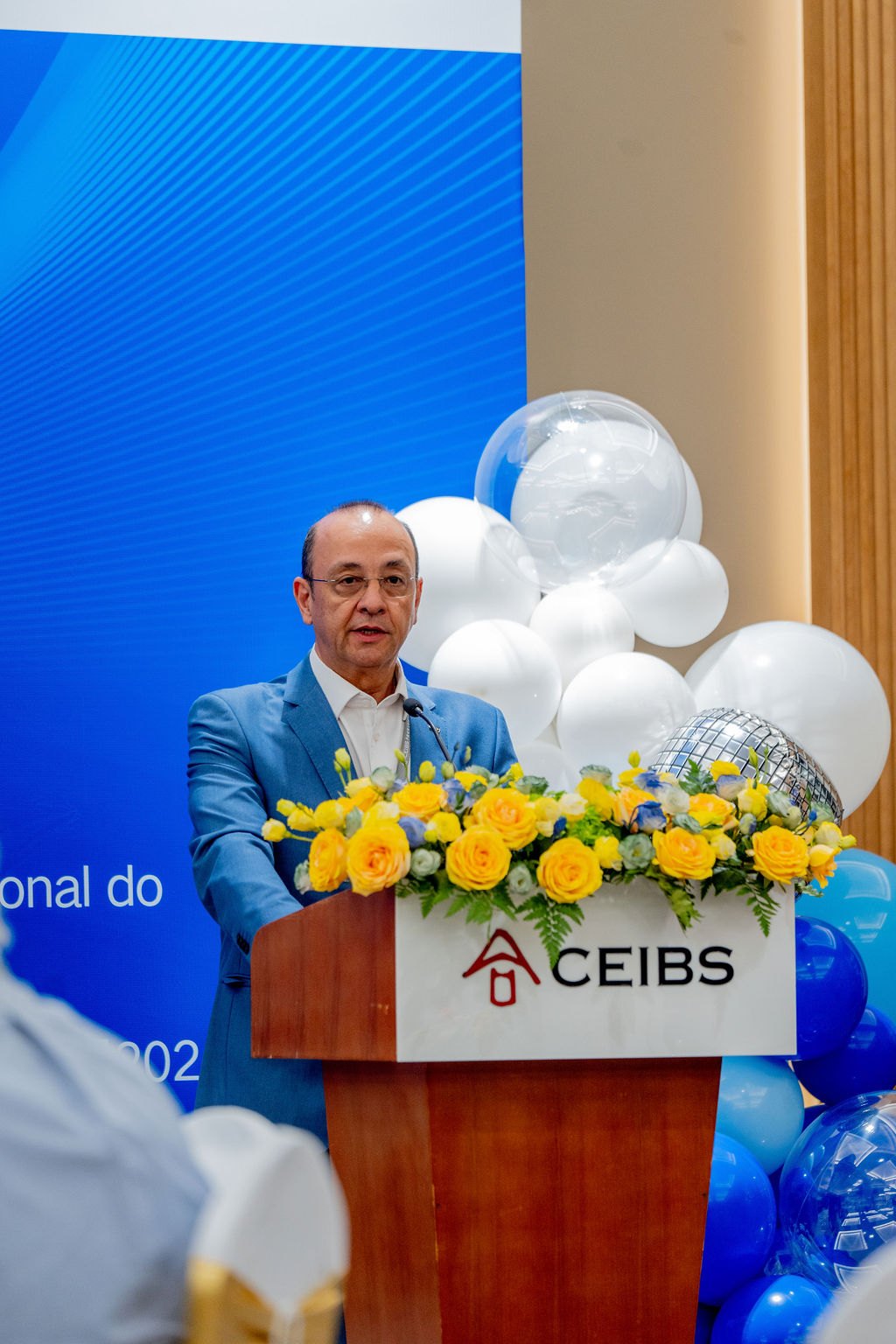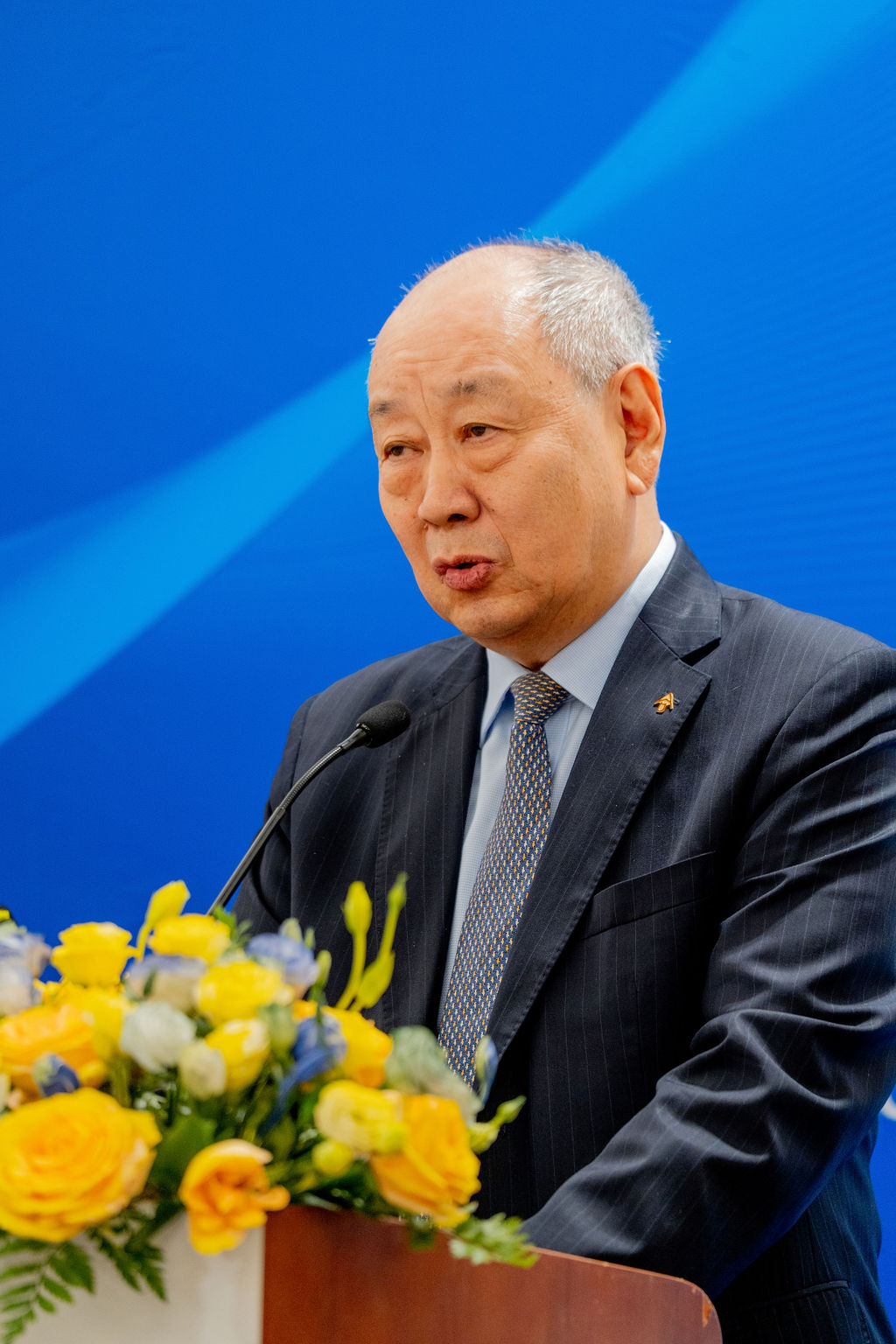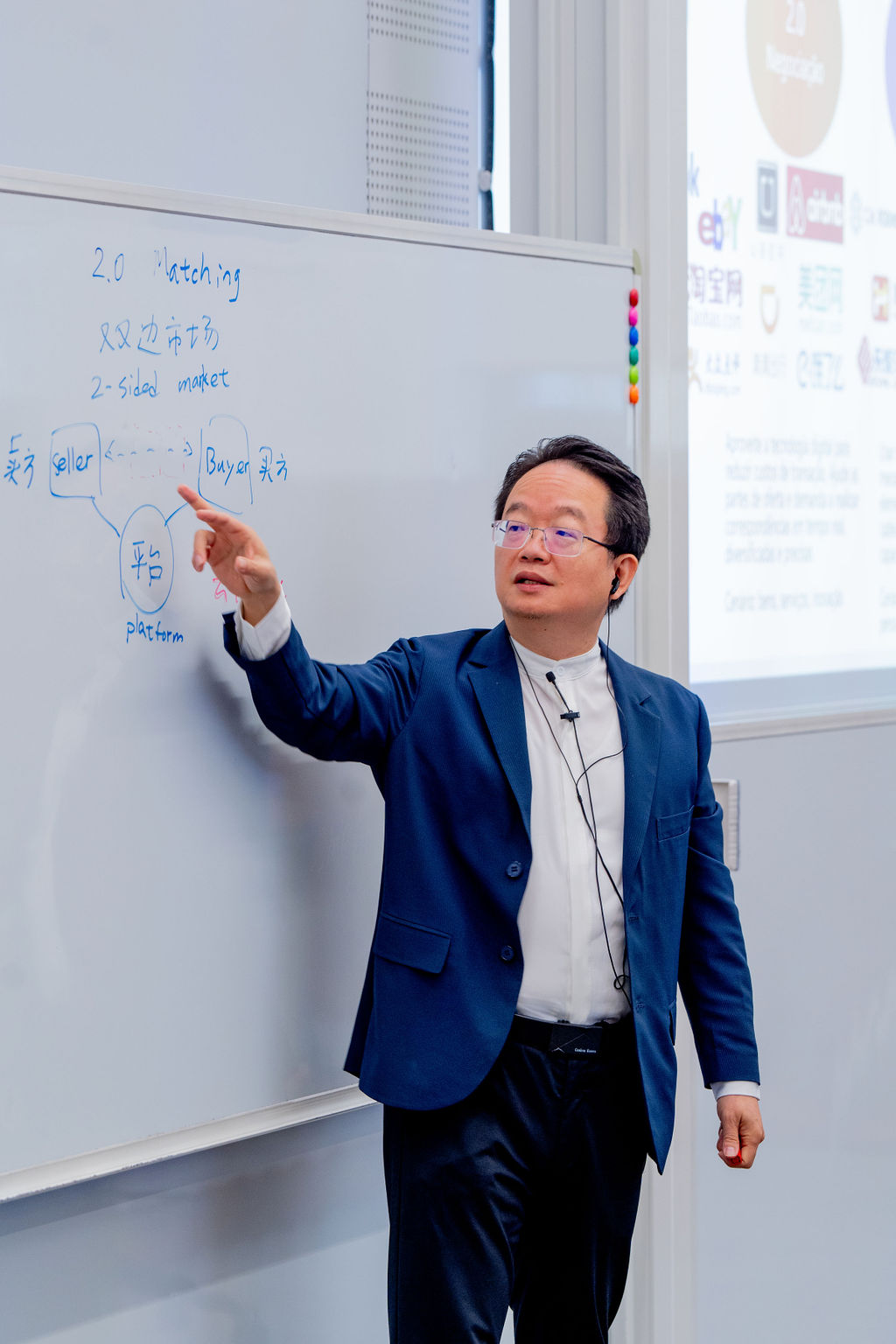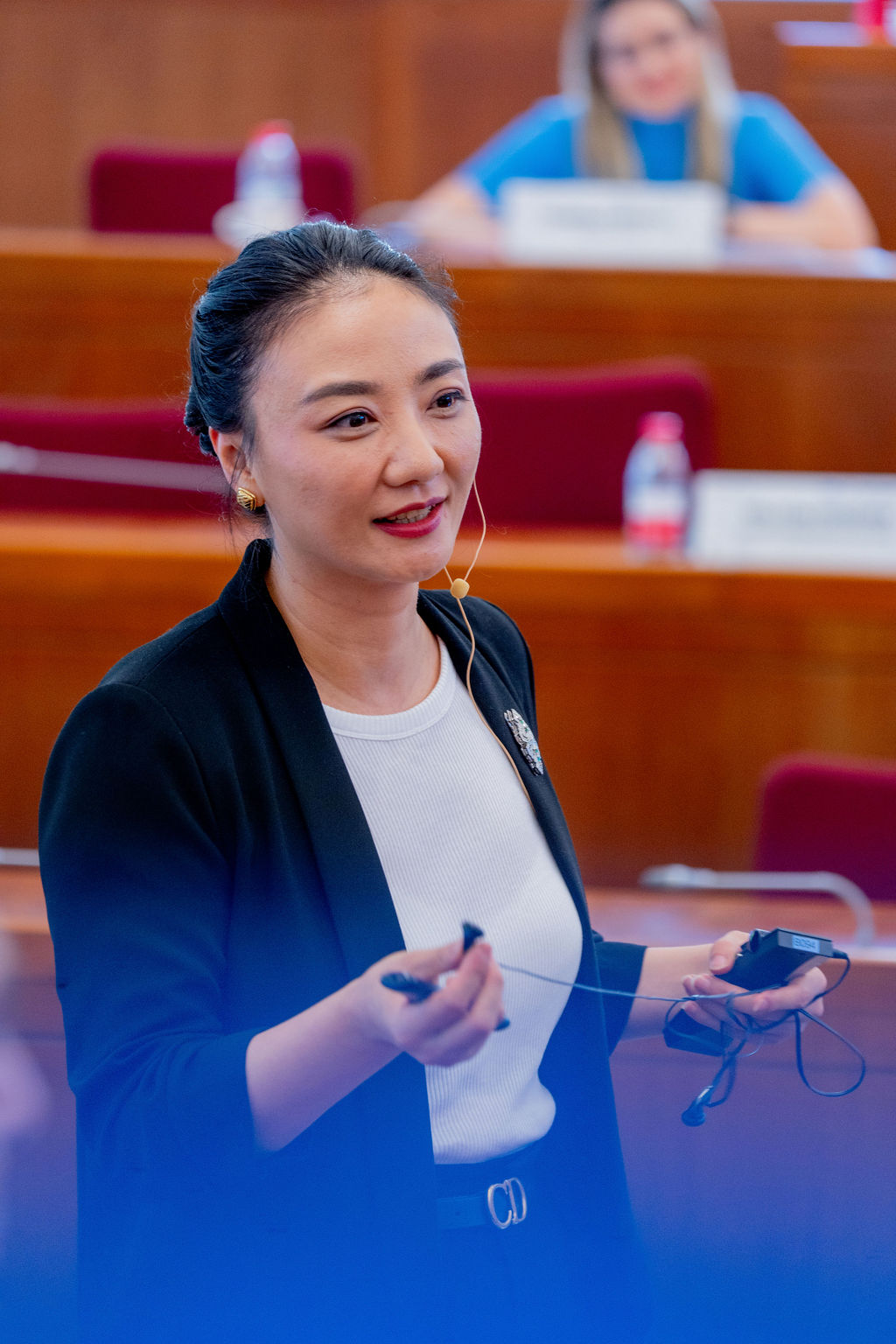“We came to CEIBS to prepare ourselves for the challenges ahead!”
Introduction:
The opening ceremony of the “Brazilian Mobility and Exponential Technology Innovation Programme 2024” featured speeches by Augusto Pestana, Consul General of Brazil in Shanghai, and Zhang Weijiong, Vice President of CEIBS.

“Conventional wisdom holds that opportunity favors only the prepared mind. We came to CEIBS to prepare ourselves for the challenges ahead, whether in business or in life. Our visit to CEIBS is all about business education. We are fortunate to have CEIBS as a key partner in Shanghai.”
Augusto Pestana
Consul General of Brazil in Shanghai

“Brazil is the world’s ninth largest economy and fifth largest country by land area, with a population of over 200 million and abundant natural resources. As the next ‘golden 50 years’ of China-Brazil relations unfold, the two countries will carry out exchanges and cooperation at various levels in many fields. In this context, our cooperation with the Brazilian partner in this programme is of great significance to us. CEIBS will continue to promote exchanges between Chinese and Brazilian companies and strive to build a platform of excellence conducive to interaction between entrepreneurs from both countries.”
Zhang Weijiong
Vice President and Co-Dean of CEIBS, Professor of Strategy
Programme Co-Director of Global CEO Programme for China
The “Brazilian Mobility and Exponential Technology Innovation Programme 2024”, the first CEIBS programme tailored for Brazilian participants, concluded in 2024, a year that marks the 50th anniversary of the establishment of diplomatic relations between China and Brazil. The Programme, which was attended by more than 50 officials and entrepreneurs from the Confederação Nacional do Transporte (CNT), is designed to facilitate exchanges and cooperation between the two countries in key areas, such as transportation, logistics and shipping, and to advance bilateral relations into the next “golden 50 years”!
Confederação Nacional do Transporte (CNT):
Founded in 1954, the Confederação Nacional do Transporte (CNT), the leading representative of Brazil’s transportation industry, coordinates and defends the interests of public and private transportation institutions at the national level, facilitating the integration of different modes of transportation such as highways, railways, waterways and aviation. The CNT is composed of 42 local federations, 5 federal unions and 28 federal associations, representing 170,000 Brazilian transportation companies. It is instrumental in promoting the development and international exchanges and cooperation of Brazil’s transportation industry.
The participants of this programme are mainly CNT members, including the CNT President, national legislators, federal representatives, and CEOs or VPs of major companies in Brazil’s shipping, transportation, logistics, and other related sectors.
Key Challenges:
As the largest country in South America and the ninth largest economy in the world, Brazil has significant market potential, making it one of the world’s top investment destinations. The CNT is poised to play a key role in driving Brazil’s economic growth by improving the country’s integrated transportation system.
In this context, the “Brazilian Mobility and Exponential Technology Innovation Programme 2024” was launched to equip Brazilian entrepreneurs with a global mindset and a forward-looking perspective on industry trends. The Programme also exposes them to international cutting-edge technologies and hands-on experience needed to foster sustainable business growth, accelerate industrial reform and catalyze innovation in business models.
In addition to its extensive experience in transportation construction and urban planning, China prides itself on its globally recognized state-of-the-art transportation technologies. The CNT hopes that the Programme, jointly developed with CEIBS, will allow Brazilian entrepreneurs to learn from China’s successes and innovative practices to improve the level and efficiency of Brazil’s transportation infrastructure, and to strengthen the sustainability of the country’s transportation industry.
Programme Highlights:
After extensive communication with the CNT, the CEIBS Company Specific Programme (CSP) team designed a curriculum that seamlessly blends theoretical lectures, company visits, policy interpretation, and cultural experiences. The goal is to provide the Brazilian participants with a holistic and forward-looking perspective, enabling them to apply the lessons learned from China’s mobility industry to their own country’s transportation market.
The Programme covers a wide range of topics, such as China’s digital innovation, platform and ecosystem strategy, AI and its business impact, innovation and paradigm shift in the automotive industry, and China’s ESG. One of the programme highlights is the opportunity for the participants to engage in in-depth exchanges with Chinese policymakers, industry experts and company executives. Distinguished guests are invited to shed light on the Chinese government’s policies and best practices in urban mobility planning and construction. Company visits can further deepen the participants’ understanding of the valuable experiences and breakthroughs of Chinese companies in areas such as mobility services, passenger transportation, freight terminals and logistics.
The CEIBS CSP team expects that these research findings and practical experiences will serve as a guiding beacon for Brazil’s transportation and related industries.
In addition, the curriculum includes a variety of immersive Chinese cultural experiences, such as bian lian (face changing) and making jiaozi (Chinese dumplings). These activities are designed to give the Brazilian friends a taste of the distinctive Chinese culture, facilitating cultural exchanges and mutual learning between China and Brazil.

Chen, Weiru
Associate Professor of Strategy, CEIBS
The curriculum covers topics such as digitalization, platform, and ecosystem strategy. Digital platform strategy revolves around two key points. One is to identify stakeholders and grow two-sided or multi-sided markets. In this strategy, the platform repositions itself in the value chain to bridge the gap between supply and demand. The other is to use network effects to make the supply and demand sides reinforce each other. The more sides join the platform, the more value is created, culminating in a mutually beneficial situation.
Take Alibaba’s Cainiao Logistics as a case study. Operating as a typical platform, Cainiao improved efficiency through digital warehousing techniques such as machine-driven QR code scanning and automated production lines. These innovations were instrumental in helping logistics companies increase their value. For example, Cainiao reduced the delivery time for China’s e-commerce logistics from five days to just one or two days and used electronic waybills to deliver a large number of packages. The platform then analyzed and improved various links in the logistics chain, with the ultimate goal of delivering packages to consumers faster, better and at a lower cost.
The curriculum also explores the evolution of urban digitization in China, with a particular focus on the digitization of transportation, enabled by the integration of vehicles, clouds and networks. The participants are encouraged to analyze how roadside sensors can ensure safety, reduce congestion, cut emissions, and improve vehicle efficiency. It is worth noting that this sector offers huge commercial opportunities and potential for expansion.

Bai, Guo
Assistant Professor of Strategy and Entrepreneurship, CEIBS
Are new energy vehicles a disruptive innovation? What paradigm shift has the rise of new energy vehicles brought to China’s auto industry? What are the catalysts for this shift? What are the implications for Brazil’s transportation industry?
By addressing the above questions, this Programme provides students with a complete picture of the rise of China’s new energy vehicle industry. It also introduces the strategic concepts behind disruptive innovation, the mechanisms for diffusion of innovative practices, and the design philosophy of the industrial policies that have facilitated this transformation. The goal of the Programme is to enable the participants to draw practical, strategic, and policy lessons from China’s thriving new energy vehicle industry.
As two major emerging economies, China and Brazil are highly complementary. Currently, Brazil is almost entirely dependent on imports from China for new energy vehicles. I hope that this Programme will be beneficial to our participants coming from far away. I also hope that they will play their due role in promoting further exchanges and cooperation between China and Brazil for common progress.
Programme Effectiveness:
The participants spoke glowingly of the Programme at its conclusion. They unanimously agreed that the varied and engaging curriculum provided them with more benefits and deeper insights than they had expected. Participant feedback included: “The Programme has kept us up to date with the evolving industry trends.” “Social networks and platforms have given us a glimpse into industry changes in China.” “We pay much attention to topics such as ESG, IoT and transportation management.” “It is crucial for us to apply the innovative solutions and ideas learned in China to the Brazilian market.” CNT President Vander Costa said: “The main objective of the Programme is to challenge our entrepreneurs out of their comfort zone.” The CNT has begun planning and preparing for the Programme in 2025 and looks forward to strengthening its cooperation with CEIBS. This will allow more Brazilian entrepreneurs to learn from China’s best practices, innovative ideas and forward-looking perspectives to revitalize Brazil’s transportation industry.
The week-long Programme enables the participants to:
- Explore China depth and global breadth: CEIBS faculty, renowned for their international backgrounds, will provide the participants with the latest theories from around the world as well as up-to-date China-focused case studies, fostering in them a forward-looking mindset. Our professors will conduct an in-depth analysis of Brazil’s mobility industry, considering its current status, challenges and opportunities in light of the country’s market dynamics. This will enable the participants to gain a deeper understanding of how to reinvigorate Brazil’s transportation industry by drawing on China’s rich experience and sophisticated technology.
- Identify trends in China’s mobility industry and draw lessons for Brazil: The participants will take a dive into the latest trends, innovative practices and success stories in China’s mobility industry through in-depth discussions with industry experts and company visits. These valuable lessons will give impetus to the equivalent sector in Brazil.
- Conduct cross-cultural exchanges: The participants will be encouraged to compare and contrast the mobility sectors in China and Brazil from a cross-cultural perspective. The aim is to stimulate innovative ideas that can promote mutual understanding and integrated development between the two countries in the mobility sector.
- Build a platform for exchanges and cooperation: The participants will explore a platform for multi-level, all-round exchanges and cooperation between China and Brazil in the fields of mobility and exponential technology. This platform will facilitate technology introduction, market expansion, knowledge sharing, talent training and policy dialogue.
- Contribute to sustainable development and social welfare: The inclusion of the ESG topic in the curriculum will inspire companies to proactively fulfill their social responsibilities and create more social welfare while pursuing economic growth. It is recommended that the participants apply China’s experience and technology in green mobility and intelligent transportation systems to their respective fields, thereby contributing to the sustainable development of both countries, especially in balancing economic growth with environmental and social needs.
Participant Feedback:
“The main objective of the Programme is to challenge our entrepreneurs out of their comfort zone. What was imagined in science fiction novels a decade ago is now a reality in China. Throughout the Programme, we looked at the transformation of the transportation industry and engaged in in-depth discussions on Brazil’s economic model.”
Vander Costa
Presidente do Sistema Transporte
“We are very fortunate to have identified the latest industry trends and opportunities. We are planning and preparing for the Programme in 2025. We hope that more Brazilian entrepreneurs will participate and apply China’s best practices, innovative ideas and forward-looking perspectives to revitalize the Brazilian economy.”
Vinicius Ladeira
Diretor Adjunto Nacional do SEST SENAT
“The Programme kept us abreast of China’s expertise and experience in technological innovation, as well as global trends in the transportation and mobility industry. This learning experience was truly invaluable.”
Daniela Medioli
Vice-presidente do Grupo Sada
“We pay much attention to topics such as ESG, IoT and transportation management. Throughout the Programme, our in-depth discussions on each question facilitated our growth and progress.”
Leonardo Mota
Diretor de Operações da Localiza&Co
“Decades ago, China was known as a country with cheap labor, but it has since emerged as a global exporter of advanced technology. On our recent trip to China, we were deeply impressed by the country’s disruptive innovation and digital transformation, particularly its exponential growth across a wide range of industries.”
Régis Tiecher
CEO da Rodonaves
“With a wealth of information and technological insight from this Programme, I’m now well equipped to think more deeply about what may lie ahead.”
Velton Dias
Diretor de Operações da Ótima Transportes
“Social networks and platforms gave us a glimpse into industry changes in China. The Programme kept us up to date with the evolving trends in the logistics industry. This experience was truly transformative for us, allowing us to rethink our business direction.”
Manuel Messias
Diretor executivo da Unidas
Locações e Serviços
“Notably, the breadth and depth of the curriculum was enhanced by the combination of theoretical lectures and company visits, providing us with a diverse and immersive experience.”
Claudio Adamuccio
CEO da G10 Transportes
“It is critical for us to communicate face-to-face with the key executives and decision-makers of Chinese companies. This experience gave us the opportunity to learn from them and gain different perspectives on real-world business dynamics.”
Camila Nicolau
Gerente de Negócios Internacionais
da Total Express
“I benefited greatly from the best practices and invaluable lessons learned from others.”
Cristian Souza
Diretor financeiro da Reiter Log
“We hope that the lessons learned in China will not only give a boost to the development of Brazilian companies, but also empower our government officials to formulate more effective long-term policies.”
Sérgio Pedrosa
Presidente da TransPedrosa
“This study tour, with a focus on innovation and entrepreneurship of the future, was a dynamic and enlightening experience!”
Nelson Trad Filho
Senador
“The experience was invaluable to us. Undoubtedly, it is crucial for us to apply the innovative solutions and ideas learned in China to the Brazilian market.”
Arthur Maia
Deputado federal
about COMPANY SPECIFIC PROGRAMME (CSP)
Co-developed by CEIBS faculty and company executives, company-specific programmes can meet the needs for talent development. The programmes popular with participants feature leadership development, innovative capability, and strategies for fast-growing markets. CEIBS faculty share up-to-date research findings with domestic and overseas companies to help them grapple with challenges faced. The latest list of customers includes Colgate, Danone, GE Healthcare, Johnson & Johnson, L'Oréal, PepsiCo, Philips, Rio Tinto Group, JD.com, New Oriental and Tencent.












